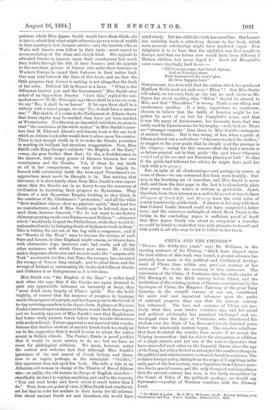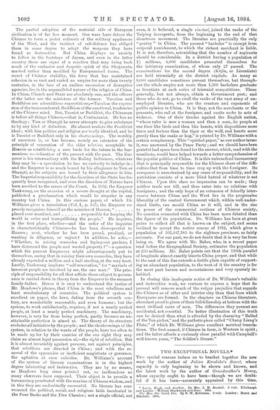CHINA AND THE CHINESE.* "Drape the thirty-five years," says Dr.
Williams, iu the opening sentence of his Preface, " which have elapsed since the first edition of this work was issued, a greater advance has probably been made in the political and intellectual develop- ment of China, than within any prev:ous century of her existence." We doubt the accuracy of this statement. The conversion of the China of Confucius into the single empire of Chi Hwang-ti, in the third century before Christ. and the institution of the existing system of literary examinations by the Lycurgus of China, the Emperor Taitsung of the great Tang dynasty, in the seventh century of our era, constituted far more real and important advances upon the paths of national progress than any that the present century has witnessed. The laws and customs of China are pre- cisely what they were twelve centuries ago, and her social and political philosophy has remained unchanged and un- developed since the days of Confucius, who distributed his wisdom over the State of Lu, three-and-twenty hundred years before the nineteenth century began. The ceaseless rebellions that have desolated the country have never—if we except the Taiping insurrection—had for object the abrogation or addition of a single statute, and not one of the various dynasties that have succeeded each other on the Imperial throne since the age of the Tang, has either desired or attempted the smallest change in the political and administrative systems it found in existence. The isolative foreign policy, dating from the reign of Yungching,in the early part of the last century, was a departure from Chinese prac- tice due to special causes, and the only change of real importance that the present century has seen, is the tardy recognition by the Court of Pekin of the political—perhaps, we should say diplomatic—equality of Western countries with the Flowery Land.
• The Middle Kingdom. By P. Woils Williams, LL.D. Revised Edition, with Illustrations and M tn. 2 To s. London Allen and Co. 1893.
The partial adoption of the material side of European civilisation is of far less moment. Our wars have driven the Chinese to form a juster estimate of the military appliances of the West, and the instinct of self-defence has obliged them in some degree to adopt the weapons they have found so destructive. But China displays no anxiety to follow in the footsteps of Japan, and even in the latter country there are signs of a reaction that may bring back much of the exclusive and despotic spirit of the Shogunate, masked rather than modified by Europeanised forms. The secret of Chinese stability, the force that has maintained cohesion in so vast and varied an empire for more than twenty centuries, in the face of an endless succession of disruptive agencies, lies in the unparalleled nature of the religion of China. In China, Church and State are absolutely one, and the officers of the latter are the ministers of the former. Taouism and Buddhism are adventitious superstitions,—Taouism the expres- sion of the transcendental, Buddhism of the emotional, tendencies of the Chinese mind. But, Taouist or Buddhist, the Chinaman is before all things Chinese,—that is, Confucianist. He has no theology ; Tien or Shangti he never attempts to give substance to by any kind of definition. He almost realises the Positivist ideal ; with him politics and religion are really identical, and he is Taouist or Buddhist only in his shortcomings. The worship of ancestors is, or has become, merely an extension of the principle of veneration of the elder relative, acceptable to Heaven as establishing a sure basis for the future in the har- monious co-ordination of the present with the past. The Em- peror is his intermediary with the Ruling Influences, whatever they may be—a speculation he has no curiosity to indulge in ; and the Emperor is as much bound by his allegiance to Tien or Shangti, as his subjects are bound by their allegiance to him. The Imperial responsibility for the disorders of the State has fre- quently been recognised, and even the disorders of Nature have been ascribed to the errors of the Court. In 1832, the Emperor Tankwang, on the occasion of a severe drought at the capital, published a proclamation which would be singular in any country but China. In this curious paper, of which Dr. Williams gives a translation (Vol. I., p. 467), the Emperor ex- pressly recognises himself as the minister of Heaven, " placed over mankind, and responsible for keeping the
world in order and tranquillising the people." He inquires, in the first place, whether—and the order of the inquiries is characteristically Chinese—he has been disrespectful to Heaven ; next, whether he has been proud, prodigal, or wanting in diligence, or unjust ? In addition, he asks,— "Whether, in raising mausolea and laying-out gardens, I have distressed the people and wasted property ?"—a question which the present Empresses might advantageously put to themselves, seeing that in raising their own mausolea, they have already expended a million and a half sterling, at the very least. Lastly, Taukwaug implores " self-renovation," for " myriads of innocent people are involved by me, the one man." The prin- ciple of responsibility for all that afflicts those subject to govern- ance is carried down in theory from the Emperor to the meanest family-father. Hence it is easy to understand the justice of Mr. Meadows's phrase, that China is the most rebellious and least revolutionary of countries. The political system is excellent on paper, the laws, dating from the seventh cen- tury, are wonderfully reasonable, and even humane ; but the system, to work satisfactorily, requires, if not a nearly perfect people, at least a nearly perfect machinery. The machinery, however, is very far from being perfect, partly because an un- attainable perfection is aimed at. The theory of its structure excludes all initiative by the people ; and the shortcomings of the system, in relation to the wants of the people, have too often to be made up for by their exercise of the one right they may claim an almost legal possession of,—the right of rebellion. But it is almost invariably against persons, not against principles, that rebellions are directed in China ; and with the re- moval of the oppressive or inefficient magistrate or governor, the agitation at once subsides. Dr. Williams's account of the system of literary examinations is in the highest degree interesting and instructive. They are by no means, as Meadows long since pointed out, so inefficacious as many observers have supposed. Their object is to provide a bureaucracy penetrated with the maxims of Chinese wisdom, and in this they are undoubtedly successful. No literate has ever recanted the political, social, and religions faith inculcated in the Four Books and the Five Classics ; not a single official, not even, it is believed, a single siu-tsai, joined the ranks of the Taiping insurgents, from the beginning to the end of that disastrous movement. The literates are practically the only "gentry " in China. The poorest " bachelor" is exempt from corporal punishment, to which the richest merchant is liable. It is not, therefore, astonishing that the number of -aspirants should be considerable. In a district having a population of 11 millions, 4,000 candidates presented themselves for the initiatory examination, of whom only 27 passed. The examinations for the second degree (Ktijin, or Licentiate) are held triennially at the district capitals. As many as 8,000 candidates sometimes present themselves, but through- out the whole empire not more than 1,300 bachelors graduate as licentiate at each series of triennial competitions. These generally, but not always, obtain a Government post; and those who do not, go to swell the ranks of the vast army of un- employed literates, who are the creators and exponents of public opinion in China. It is they, not the merchants or the peasants, who rail at the foreigner, and excite mobs to acts of violence. One of their tirades against the English nation, " whose ruler is now a woman and then a man, its people at one time like birds and then like beasts, with dispositions more fierce and furious than the tiger or the wolf, and hearts more greedy than the snake or hog," is printed by Dr. Williams with a certain complacency. This "spirited paper," as our author terms it, was answered by the Peace Party ; and we should have been grateful had space been found for the answer, which, read with the manifesto, would have helped towards a better comprehension of the popular politics of China. It is this unbeneficed bureaucracy that is principally responsible for the Chinese share of the diffi- culties that from time to time crop up with the foreigner. Its arrogance is unrestrained by any sense of responsibility, and its patriotism consists of a mere blind hatred of whatever is not Chinese. Upon this class no impression can be made ; they neither trade nor till, and thus enter into no relations with foreigners ; and the only hope of an extension of friendly inter- course between China and the West lies in the progressive liberality of the central Government which, within well-under- stood limits, can mould China as it will, and in the rise to power of the commercial sections of Chinese society. No question connected with China has been more debated than the figure of its population. Dr. Williams has been at great pains to collect all that is known on the subject, and seems inclined to accept the native census of 1812, which gives a population of 362,447,183 to the eighteen provinces, as fairly accurate. For our part, we do not doubt that it is very far from being so. We agree with Mr. Baber, who, in a recent paper read before the Geographical Society, estimates the population at 230 millions. Mr. Baber points out that the 110th parallel of longitude almost exactly bisects China proper, and that while to the east of this line extends a fertile plain capable of support- ing an abundant population, to the west of it the country is for the most part barren and mountainous and very sparsely in- habited.
In closing this inadequate notice of Dr. Williams's valuable and instructive work, we venture to express a hope that its perusal will remove much of the vulgar prejudice that regards the Chinese as of other and inferior clay than that from which Europeans are formed. In the chapters on Chinese literature, abundant proof is given of their full fellowship at bottom with the most civilised races of men. The differences they present are accidental, not essential. No better illustration of this truth can be desired than what is afforded by the charming "Ballad of the Tea-picker," and the pathetic piece called " Chang Liang's Flute," of which Dr. Williams gives excellent metrical transla- tions. The first-named, if Chinese in form, is Western in spirit ; and the latter affords a curiously close parallel with Campbell's well-known poem, " The Soldier's Dream."



































 Previous page
Previous page